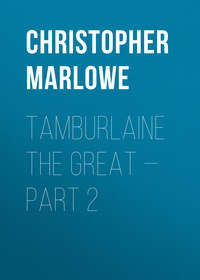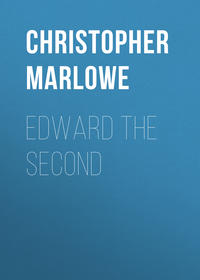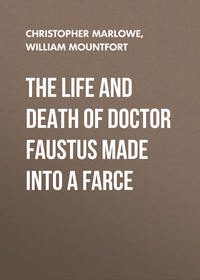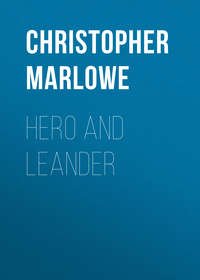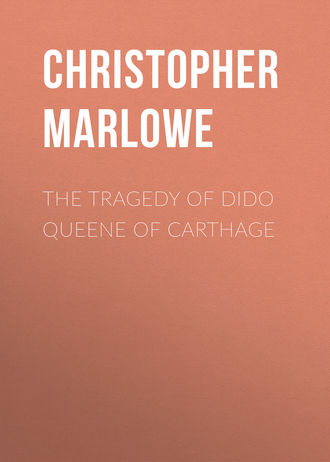 полная версия
полная версияThe Tragedy of Dido Queene of Carthage

Christopher Marlowe
The Tragedy of Dido Queene of Carthage
This play is facsimiled from the Bodley copy. Other examples (says Sir Sidney Lee, but unrecorded by Greg) are at Bridgewater House and at Chatsworth; the Devonshire Collection of Plays has recently been disposed of to an American collector.
For other and bibliographical details see D.N.B. I have included in this facsimile the page of manuscript in the Bodley example inasmuch as it contains matter of interest to the student.
The reproduction from the original was made by The Clarendon Press, Oxford.
JOHN S. FARMER.[Transcriber's Note: The following paragraphs have been transcribed from a handwritten page. Some text is illegible, and this has been marked with asterisks where appropriate.]
The tragedy of Dido is one of the scarcest plays in the English language. There are but two copies known to be extant; in the possession of D^r Wright and M^r Reed.
M^r Warton speaks in his Hist. of Eng. Poet (III. p. 435) of an Elegy being prefixed to it on the death of Marlowe; but no such is found in either of those copies. In answer to my inquiries on this subject he informed me by letter, [crossed-out text] that a copy of this play was in Osborne's catalogue in the year 1754, that he then saw it in his shop (together with several of M^r Oldys's books that Osborne had purchased), + that the elegy in question—"on Marlowe's untimely death" was inserted immediately after the title page; that it mentioned a play of Marlowe's entitled The Duke of Guise and four others; but whether particularly by name, he could not recollect. Unluckily he did not purchase this rare piece, + it is now God knows where.
Bishop Tanner likewise mentions this elegy in so particular a manner that he must have seen it. "Marlovius (Christopherus), quondam in academia Cantabrigiensi musarum alumnus; postea actor scenicus; deinde poeta dramaticus tragicus, paucis inferior Scripsit plurimas tragedias, sc. Tamerlane.-Tragedie of Dido Queen of Carthage. Pr. Come gentle Ganymed. Hanc perfecit + edidit Tho. Nash Lond. 1594. 4^to.—Petrarius in præfatione ad Secundam partem Herois et Leandri multa in Marlovii commendationem adfert; hoc etiam facit Tho. Nash in Carmine Elegiaco Tragidiæ Didonis præfiso in obitum Christop. Marlovii, ubi quatuor ejus tragidiarum mentionem facit, nec non et alterius de duce Guisio." Bib. Britan. 1740.
I suspect M^r Warton had no other authority than this for saying that this play was left imperfect by Marlowe, and completed + published by Nashe; for it does not appear from the title page that it was not written in conjunction by him + Marlowe in the lifetime of the former. Perhaps Nashe's Elegy might ascertain this point. Tanner had, I believe, no authority but Philipses, for calling Marlowe an actor.
There was an old Latin play on the subject of Dido, written by
John Rightwise and played before Cardinal Wolsey + again before
Queen Elizabeth in 1564. There is also another Latin play on this
subject Dido, tragedia nova so quatuor pri*ibus ***
**************** Virgilii disampla Antwerp ed, 1559.
THE Tragedie of Dido Queene of Carthage:
Played by the Children of her Maiesties Chappell.
Written by Christopher Marlowe, and Thomas Nash. Gent.
Actors
Iupiter. Ascanius. Ganimed. Dido. Venus. Anna. Cupid. Achates. Iuno. Ilioneus. Mercurie. Iarbas. Hermes. Cloanthes. Æneas. Sergestus.
The Tragedie of Dido Queene of Carthage
Here the Curtaines draw, there is discovered Iupiter dandling Ganimed upon his knee, and Mercury lying asleepe.
Iup. Come gentle Ganimed and play with me, I loue thee well, say Iuno what she will.
Gan. I am much better for your worthles loue,That will not shield me from her shrewith blowes:To day when as I fild into your cups,And held the cloath of pleasance whiles you dranke,She reacht me such a rap for that I spilde,As made the bloud run downe about mine eares.Iup. What? dares she strike the darling of my thoughts?By Saturnes soule, and this earth threatning aire,That shaken thrise, makes Natures buildings quake,I vow, if she but once frowne on thee more,To hang her meteor like twixt heauen and earth,And bind her hand and foote with golden cordes,As once I did for harming Hercules.Gan. Might I but see that pretie sport a foote,O how would I with Helens brother laugh,And bring the Gods to wonder at the game:Sweet Iupiter, if ere I pleasde thine eye,Or seemed faire walde in with Egles wings,Grace my immortall beautie with this boone,And I will spend my time in thy bright armes.Iup. What ist sweet wagge I should deny thy youth?Whose face reflects such pleasure to mine eyes,As I exhal'd with thy fire darting beames,Haue oft driuen backe the horses of the night.When as they would haue hal'd thee from my sight:Sit on my knee, and call for thy content,Controule proud Fate, and cut the thred of time,Why are not all the Gods at thy commaund,And heauen and earth the bounds of thy delight?Vulcan shall daunce to make thee laughing sport,And my nine Daughters sing when thou art sad,From Iunos bird Ile pluck her spotted pride,To make thee fannes wherewith to coole thy face,And Venus Swannes shall shed their siluer downe,To sweeten out the slumbers of thy bed:Hermes no more shall shew the world his wings,If that thy fancie in his feathers dwell,But as this one Ile teare them all from him,Doe thou but say their colour pleaseth me:Hold here my little loue these linked gems,My Iuno ware vpon her marriage day,Put thou about thy necke my owne sweet heart,And tricke thy armes and shoulders with my theft.Gan. I would haue a iewell for mine eare, And a fine brouch to put in my hat, And then Ile hugge with you an hundred times.
Iup. And shall haue Ganimed, if thou wilt be my loue.Enter Venus.
Venus. I this is it, you can sit toying there,And playing with that female wanton boy,Whiles my Æneas wanders on the Seas,And rests a pray to euery billowes pride.Iuno, false Iuno in her Chariots pompe,Drawne through the heauens by Steedes of Boreas brood,Made Hebe to direct her ayrie wheelesInto the windie countrie of the clowdes,Where finding Æolus intrencht with stormes,And guarded with a thousand grislie ghosts,She humbly did beseech him for our bane,And charg'd him drowne my sonne with all his traine.Then gan the windes breake ope their brazen doores,And all Æolia to be vp in armes:Poore Troy must now be sackt vpon the Sea,And Neptunes waues be enuious men of warre,Epeus horse to Ætnas hill transformd,Prepared stands to wracke their woodden walles,And Æolus like Agamemnon soundsThe surges, his fierce souldiers to the spoyle:See how the night Ulysses-like comes forth,And intercepts the day as Dolon erst:Ay me! the Starres supprisde like Rhesus Steedes,Are drawne by darknes forth Astræus tents.What shall I doe to saue thee my sweet boy?When as the waues doe threat our Chrystall world,And Proteus raising hils of flouds on high,Entends ere long to sport him in the skie.False Iupiter, rewardst thou vertue so?What? is not pietie exempt from woe?Then dye Æneas in thine innocence,Since that religion hath no recompence.Iup. Content thee Cytherea in thy care,Since thy Æneas wandring fate is firme,Whose wearie lims shall shortly make repose,In those faire walles I promist him of yore:But first in bloud must his good fortune bud,Before he be the Lord of Turnus towne,Or force her smile that hetherto hath frownd:Three winters shall he with the Rutiles warre,And in the end subdue them with his sword,And full three Sommers likewise shall he waste,In mannaging those fierce barbarian mindes:Which once performd, poore Troy so long supprest,From forth her ashes shall aduance her head,And flourish once againe that erst was dead:But bright Ascanius beauties better worke,Who with the Sunne deuides one radiant shape,Shall build his throne amidst those starrie towers,That earth-borne Atlas groning vnderprops:No bounds but heauen shall bound his Emperie,Whose azured gates enchased with his name,Shall make the morning halt her gray vprise,To feede her eyes with his engrauen fame.Thus in stoute Hectors race three hundred yeares,The Romane Scepter royall shall remaine,Till that a Princesse priest conceau'd by Mars,Shall yeeld to dignitie a dubble birth,Who will eternish Troy in their attempts.Venus. How may I credite these thy flattering termes,When yet both sea and sands beset their ships,And Phœbus as in stygian pooles, refrainesTo taint his tresses in the Tyrrhen maine?Iup. I will take order for that presently: Hermes awake, and haste to Neptunes realme, Whereas the Wind-god warring now with Fate, Besiege the ofspring of our kingly loynes, Charge him from me to turne his stormie powers, And fetter them in Vulcans sturdie brasse, That durst thus proudly wrong our kinsmans peace. Venus farewell, thy sonne shall be our care: Come Ganimed, we must about this geare.
Exeunt Iupiter cum Ganimed.
Venus. Disquiet Seas lay downe your swelling lookes,And court Æneas with your calmie cheere,Whose beautious burden well might make you proude,Had not the heauens conceau'd with hel-borne clowdes,Vaild his resplendant glorie from your view,For my sake pitie him Oceanus,That erst-while issued from thy watrie loynes,And had my being from thy bubling froth:Triton I know hath fild his trumpe with Troy,And therefore will take pitie on his toyle,And call both Thetis and Cimodoæ,To succour him in this extremitie.Enter Æneas with Ascanius, with one or two more.
What? doe I see my sonne now come on shoare:Venus, how art thou compast with content,The while thine eyes attract their sought for ioyes:Great Iupiter, still honourd maist thou be,For this so friendly ayde in time of neede.Here in this bush disguised will I stand,Whiles my Æneas spends himselfe in plaints,And heauen and earth with his vnrest acquaints.Æn. You sonnes of care, companions of my course,Priams misfortune followes vs by sea,And Helens rape doth haunt thee at the heeles.How many dangers haue we ouer past?Both barking Scilla, and the sounding Rocks,The Cyclops shelues, and grim Ceranias seateHaue you oregone, and yet remaine aliue!Pluck vp your hearts, since fate still rests our friend,And chaunging heauens may those good daies returne,Which Pergama did vaunt in all her pride.Acha. Braue Prince of Troy, thou onely art our God,That by thy vertues freest vs from annoy,And makes our hopes suruiue to cunning ioyes:Doe thou but smile, and clowdie heauen will cleare,Whose night and day descendeth from thy browes:Though we be now in extreame miserie,And rest the map of weatherbeaten woe:Yet shall the aged Sunne shed forth his aire,To make vs liue vnto our former heate,And euery beast the forrest doth send forth,Bequeath her young ones to our scanted foode.Asca. Father I faint, good father giue me meate.Æn. Alas sweet boy, thou must be still a while,Till we haue fire to dresse the meate we kild:Gentle Achates, reach the Tinder boxe,That we may make a fire to warme vs with,And rost our new found victuals on this shoare.Venus. See what strange arts necessitie findes out, How neere my sweet Æneas art thou driuen?
Æn. Hold, take this candle and goe light a fire, You shall haue leaues and windfall bowes enow Neere to these woods, to rost your meate withall: Ascanius, goe and drie thy drenched lims, Whiles I with my Achates roaue abroad, To know what coast the winde hath driuen vs on, Or whether men or beasts inhabite it.
Acha. The ayre is pleasant, and the soyle most fitFor Cities, and societies supports:Yet much I maruell that I cannot finde,No steps of men imprinted in the earth.Venus. Now is the time for me to play my part:Hoe yong men, saw you as you cameAny of all my Sisters wandring here?Hauing a quiuer girded to her side,And cloathed in a spotted Leopards skin.Æn. I neither saw nor heard of any such:But what may I faire Virgin call your name?Whose lookes set forth no mortall forme to view,Nor speech bewraies ought humaine in thy birth,Thou art a Goddesse that delud'st our eyes,And shrowdes thy beautie in this borrowd shape;But whether thou the Sunnes bright Sister be,Or one of chast Dianas fellow Nimphs,Liue happie in the height of all content,And lighten our extreames with this one boone,As to instruct us vnder what good heauenWe breathe as now, and what this world is calde,On which by tempests furie we are cast,Tell vs, O tell vs that are ignorant,And this right hand shall make thy Altars crackWith mountaine heapes of milke white Sacrifize.Venus. Such honour, stranger, doe I not affect:It is the vse for Turen maides to weareTheir bowe and quiuer in this modest sort,And suite themselues in purple for the nonce,That they may trip more lightly ore the lawndes,And ouertake the tusked Bore in chase.But for the land whereof thou doest enquire,It is the punick kingdome rich and strong,Adioyning on Agenors stately towne,The kingly seate of Southerne Libia,Whereas Sidonian Dido rules as Queene.But what are you that aske of me these things?Whence may you come, or whither will you goe?Æn. Of Troy am I, Æneas is my name,Who driuen by warre from forth my natiue world,Put sailes to sea to seeke out Italy;And my diuine descent from sceptred Iove,With twise twelue Phrigian ships I plowed the deepe,And made that way my mother Venus led:But of them all scarce seuen doe anchor safe,And they so wrackt and weltred by the waues,As euery tide tilts twixt their oken sides:And all of them vnburdened of their loade,Are ballassed with billowes watrie weight.But haples I, God wot, poore and vnknowne,Doe trace these Libian deserts all despisde,Exild forth Europe and wide Asia both,And haue not any couerture but heauen.Venus. Fortune hath fauord thee what ere thou be,In sending thee vnto this curteous Coast:A Gods name on and hast thee to the Court,Where Dido will receiue ye with her smiles:And for thy ships which thou supposest lost,Not one of them hath perisht in the storme,But are ariued safe not farre from hence:And so I leaue thee to thy fortunes lot,Wishing good lucke vnto thy wandring steps. Exit.Æn. Achates, tis my mother that is fled,I know her by the mouings of her feete:Stay gentle Venus, flye not from thy sonne,Too cruell, why wilt thou forsake me thus?Or in these shades deceiu'st mine eye so oft?Why talke we not together hand in hand?And tell our griefes in more familiar termes:But thou art gone and leau'st me here alone,To dull the ayre with my discoursiue moane. Exit.Enter Illioneus, and Cloanthes.
Illio. Follow ye Troians, follow this braue Lord, And plaine to him the summe of your distresse.
Iar. Why, what are you, or wherefore doe you sewe?Illio. Wretches of Troy, enuied of the windes,That craue such fauour at your honors feete,As poore distressed miserie may pleade:Saue, saue, O saue our ships from cruell fire,That doe complaine the wounds of thousand waues,And spare our liues whom euery spite pursues.We come not we to wrong your Libian Gods,Or steale your houshold lares from their shrines:Our hands are not prepar'd to lawles spoyle,Nor armed to offend in any kind:Such force is farre from our vnweaponed thoughts,Whose fading weale of victorie forsooke,Forbids all hope to harbour neere our hearts.Iar. But tell me Troians, Troians if you be, Vnto what fruitfull quarters were ye bound, Before that Boreas buckled with your sailes?
Cloan. There is a place Hesperia term'd by vs,An ancient Empire, famoused for armes,And fertile in faire Ceres furrowed wealth,Which now we call Italia of his name,That in such peace long time did rule the same:Thither made we,When suddenly gloomie Orion rose,And led our ships into the shallow sands,Whereas the Southerne winde with brackish breath,Disperst them all amongst the wrackfull Rockes:From thence a fewe of vs escapt to land,The rest we feare are foulded in the flouds.Iar. Braue men at armes, abandon fruitles feares, Since Carthage knowes to entertaine distresse.
Serg. I but the barbarous sort doe threat our ships,And will not let vs lodge vpon the sands:In multitudes they swarme vnto the shoare,And from the first earth interdict our feete.Iar. My selfe will see they shall not trouble ye,Your men and you shall banquet in our Court,And euery Troian be as welcome here,As Iupiter to sillie Vausis house:Come in with me, Ile bring you to my Queene,Who shall confirme my words with further deedes.Serg. Thankes gentle Lord for such vnlookt for grace,Might we but once more see Æneas face,Then would we hope to quite such friendly turnes,As shall surpasse the wonder of our speech.Actus 2
Enter Æneas, Achates, and Ascanius.
Æn. Where am I now? these should be Carthage walles.Acha. Why stands my sweete Æneas thus amazde?Æn. O my Achates, Theban Niobe,Who for her sonnes death wept out life and breath,And drie with griefe was turnd into a stone,Had not such passions in her head as I.Me thinkes that towne there should be Troy, yon Idas hill,There Zanthus streame, because here's Priamus,And when I know it is not, then I dye.Ach. And in this humor is Achates to,I cannot choose but fall vpon my knees,And kisse his hand: O where is Hecuba,Here she was wont to sit, but sauing ayreIs nothing here, and what is this but stone?Æn. O yet this stone doth make Æneas weepe,And would my prayers (as Pigmalions did)Could giue it life, that vnder his conductWe might saile backe to Troy and be reuengdeOn these hard harted Grecians; which reioyceThat nothing now is left of Priamus:O Priamus is left and this is he,Come, come abourd, pursue the hatefull Greekes.Acha. What means Æneas?Æn. Achates though mine eyes say this is stone, Yet thinkes my minde that this is Priamus: And when my grieued heart sighes and sayes no, Then would it leape out to giue Priam life: O were I not at all so thou mightst be. Achates, see King Priam wags his hand, He is aliue, Troy is not ouercome.
Ach. Thy mind Æneas that would haue it so Deludes thy eye sight, Priamus is dead.
Æn. Ah Troy is sackt, and Priamus is dead, And why should poore Æneas be aliue?
Asca. Sweete father leaue to weepe, this is not he: For were it Priam he would smile on me.
Acha. Æneas see here come the Citizens, Leaue to lament lest they laugh at our feares.
Enter Cloanthus, Sergestus, Illioneus.
Æn. Lords of this towne, or whatsoeuer stileBelongs vnto your name, vouchsafe of ruthTo tell vs who inhabits this faire towne,What kind of people, and who gouernes them:For we are strangers driuen on this shore,And scarcely know within what Clime we are.Illio. I heare Æneas voyce, but see him not, For none of these can be our Generall.
Acha. Like Illioneus speakes this Noble man, But Illioneus goes not in such robes.
Serg. You are Achates, or I deciu'd.Acha. Æneas see Sergestus or his ghost.Illio. He meanes Æneas, let vs kisse his feete.Cloan. It is our Captaine, see Ascanius.Serg. Liue long Æneas and Ascanius.Æn. Achates, speake, for I am ouerioyed.Acha. O Illioneus, art thou yet aliue?Illio. Blest be the time I see Achates face.Cloan. Why turnes Æneas from his trustie friends?Æn. Sergestus, Illioneus and the rest,Your sight amazde me, O what destiniesHaue brought my sweete companions in such plight?O tell me, for I long to be resolu'd.Illio. Louely Æneas, these are Carthage walles,And here Queene Dido weares th'imperiall Crowne,Who for Troyes sake hath entertaind vs all,And clad vs in these wealthie robes we weare.Oft hath she askt vs vnder whom we seru'd,And when we told her she would weepe for griefe,Thinking the sea had swallowed vp thy ships,And now she sees thee how will she reioyce?Serg. See where her seruitors passe through the hall Bearing a banket, Dido is not farre.
Illio. Looke where she comes: Æneas viewd her well.Æn. Well may I view her, but she sees not me.Enter Dido and her traine.
Dido. What stranger art thou that doest eye me thus?Æn. Sometime I was a Troian mightie Queene: But Troy is not, what shall I say I am?
Illio. Renowmed Dido, tis our Generall: warlike Æneas.Dido. Warlike Æneas, and in these base robes? Goe fetch the garment which Sicheus ware: Braue Prince, welcome to Carthage and to me, Both happie that Æneas is our guest: Sit in this chaire and banquet with a Queene, Æneas is Æneas, were he clad In weedes as bad as euer Irus ware.
Æn. This is no seate for one thats comfortles,May it please your grace to let Æneas waite:For though my birth be great, my fortunes meane,Too meane to be companion to a Queene.Dido. Thy fortune may be greater then thy birth,Sit downe Æneas, sit in Didos place,And if this be thy sonne as I suppose,Here let him sit, be merrie louely child.Æn. This place beseemes me not, O pardon me.Dido. Ile haue it so, Æneas be content.Asca. Madame, you shall be my mother.Dido. And so I will sweete child: be merrie man, Heres to thy better fortune and good starres.
Æn. In all humilitie I thanke your grace.Dido. Remember who thou art, speake like thy selfe, Humilitie belongs to common groomes.
Æn. And who so miserable as Æneas is?Dido. Lyes it in Didos hands to make thee blest, Then be assured thou art not miserable.
Æn. O Priamus, O Troy, oh Hecuba!Dido. May I entreate thee to discourse at large,And truely to how Troy was ouercome:For many tales goe of that Cities fall,And scarcely doe agree vpon one poynt:Some say Antenor did betray the towne,Others report twas Sinons periurie:But all in this that Troy is ouercome,And Priam dead, yet how we heare no newes.Æn. A wofull tale bids Dido to vnfould,Whose memorie like pale deaths stony mace,Beates forth my senses from this troubled soule,And makes Æneas sinke at Didos feete.Dido. What faints Æneas to remember Troy? In whose defence he fought so valiantly: Looke vp and speake.
Æn. Then speake Æneas with Achilles tongue,And Dido and you Carthaginian PeeresHeare me, but yet with Mirmidons harsh eares,Daily inur'd to broyles and Massacres,Lest you be mou'd too much with my sad tale.The Grecian souldiers tired with ten yeares warre;Began to crye, let vs vnto our ships,Troy is inuincible, why stay we here?With whose outcryes Atrides being apal'd,Summoned the Captaines to his princely tent,Who looking on the scarres we Troians gaue,Seeing the number of their men decreast,And the remainder weake and out of heart,Gaue vp their voyces to dislodge the Campe,And so in troopes all marcht to Tenedos:Where when they came, Vlysses on the sandAssayd with honey words to turne them backe:And as he spoke to further his entent,The windes did driue huge billowes to the shoare,And heauen was darkned with tempestuous clowdes:Then he alleag'd the Gods would haue them stay,And prophecied Troy should be ouercome:And therewithall he calde false Sinon forth,A man compact of craft and periurie,Whose ticing tongue was made of Hermes pipe,To force an hundred watchfull eyes to sleepe:And him Epeus hauing made the horse,With sacrificing wreathes vpon his head,Vlysses sent to our vnhappie towne:Who groueling in the mire of Zanthus bankes,His hands bound at his back, and both his eyesTurnd vp to heauen as one resolu'd to dye,Our Phrigian shepherd haled within the gates,And brought vnto the Court of Priamus:To whom he vsed action so pitifull,Lookes so remorcefull, vowes so forcible,As therewithall the old man ouercome,Kist him, imbrast him, and vnloosde his bands,And then, O Dido pardon me.Dido. Nay leaue not here, resolue me of the rest.Æn. O th'inchaunting words of that base slaue,Made him to thinke Epeus pine-tree HorseA sacrifize t'appease Mineruas wrath:The rather for that one LaocoonBreaking a speare vpon his hollow breast,Was with two winged Serpents stung to death.Whereat agast, we were commanded straightWith reuerence to draw it into Troy.In which vnhappie worke was I employd,These hands did helpe to hale it to the gates,Through which it could not enter twas so huge.O had it neuer entred, Troy had stood.But Priamus impatient of delay,Inforst a wide breach in that rampierd wall,Which thousand battering Rams could neuer pierce,And so came in this fatall instrument:At whose accursed feete as ouerioyed,We banquetted till ouercome with wine,Some surfetted, and others soundly slept.Which Sinon viewing, causde the Greekish spyesTo hast to Tenedos and tell the Campe:Then he vnlockt the Horse, and suddenlyFrom out his entrailes, NeoptolemusSetting his speare vpon the ground, leapt forth,And after him a thousand Grecians more,In whose sterne faces shin'd the quenchles fire,That after burnt the pride of Asia.By this the Campe was come vnto the walles,And through the breach did march into the streetes,Where meeting with the rest, kill kill they cryed.Frighted with this confused noyse, I rose,And looking from a turret, might beholdYong infants swimming in their parents bloud,Headles carkasses piled vp in heapes,Virgins halfe dead dragged by their golden haire,And with maine force flung on a ring of pikes,Old men with swords thrust through their aged sides,Kneeling for mercie to a Greekish lad,Who with steele Pol-axes dasht out their braines.Then buckled I mine armour, drew my sword,And thinking to goe downe, came Hectors ghostWith ashie visage, blewish, sulphure eyes,His armes torne from his shoulders, and his breastFurrowd with wounds, and that which made me weepe,Thongs at his heeles, by which Achilles horseDrew him in triumph through the Greekish Campe,Burst from the earth, crying, Æneas flye,Troy is a fire, the Grecians haue the towne,Dido. O Hector who weepes not to heare thy name?Æn. Yet flung I forth, and desperate of my life,Ran in the thickest throngs, and with this swordSent many of their sauadge ghosts to hell.At last came Pirrhus fell and full of ire.His harnesse dropping bloud, and on his speareThe mangled head of Priams yongest sonne,And after him his band of Mirmidons,With balles of wilde fire in their murdering pawes,Which made the funerall flame that burnt faire Troy:All which hemd me about, crying, this is he.Dido. Ah, how could poore Æneas scape their hands?Æn. My mother Venus iealous of my health,Conuaid me from their crooked nets and bands:So I escapt the furious Pirrhus wrath:Who then ran to the pallace of the King,And at Ioues Altar finding Priamus,About whose withered necke hung Hecuba,Foulding his hand in hers, and ioyntly bothBeating their breasts and falling on the ground,He with his faulchions poynt raisde vp at once,And with Megeras eyes stared in their face,Threatning a thousand deaths at euery glaunce.To whom the aged King thus trembling spoke:Achilles sonne, remember what I was,Father of fiftie sonnes, but they are slaine,Lord of my fortune, but my fortunes turnd,King of this Citie, but my Troy is fired,And now am neither father, Lord, nor King:Yet who so wretched but desires to liue?O let me liue, great Neoptolemus,Not mou'd at all, but smiling at his teares,This butcher whil'st his hands were yet held vp,Treading vpon his breast, strooke off his hands.Dido. O end Æneas, I can heare no more.Æn. At which the franticke Queene leapt on his face,And in his eyelids hanging by the nayles,A little while prolong'd her husbands life:At last the souldiers puld her by the heeles,And swong her howling in the emptie ayre,Which sent an eccho to the wounded King:Whereat he lifted vp his bedred lims,And would haue grappeld with Achilles sonne,Forgetting both his want of strength and hands,Which he disdaining whiskt his sword about,And with the wound thereof the King fell downe:Then from the nauell to the throat at once,He ript old Priam: at whose latter gaspeIoues marble statue gan to bend the brow,As lothing Pirrhus for this wicked act:Yet he vndaunted tooke his fathers flagge,And dipt it in the old Kings chill cold bloud,And then in triumph ran into the streetes,Through which he could not passe for slaughtred men:So leaning on his sword he stood stone still,Viewing the fire wherewith rich Ilion burnt.By this I got my father on my backe,This yong boy in mine armes, and by the handLed faire Creusa my beloued wife,When thou Achates with thy sword mad'st way,And we were round inuiron'd with the Greekes:O there I lost my wife: and had not weFought manfully, I had not told this tale:Yet manhood would not serue, of force we fled,And as we went vnto our ships, thou knowestWe sawe Cassandra sprauling in the streetes,Whom Aiax rauisht in Dianas Fawne,Her cheekes swolne with sighes, her haire all rent,Whom I tooke vp to beare vnto our ships;But suddenly the Grecians followed vs,And I alas, was forst to let her lye.Then got we to our ships, and being abourd,Polixena cryed out, Æneas stay,The Greekes pursue me, stay and take me in.Moued with her voyce, I lept into the sea,Thinking to beare her on my backe abourd:For all our ships were launcht into the deepe,And as I swomme, she standing on the shoare,Was by the cruell Mirmidons surprizd,And after by that Pirrhus sacrifizde.Dido. I dye with melting ruth, Æneas leaue.Anna. O what became of aged Hecuba?Iar. How got Æneas to the fleete againe?Dido. But how scapt Helen, she that causde this warre?Æn. Achates speake, sorrow hath tired me quite.Acha. What happened to the Queene we cannot shewe,We heare they led her captiue into Greece,As for Æneas he swomme quickly backe,And Helena betraied DiiphobusHer Louer, after Alexander dyed,And so was reconcil'd to Menelaus.Dido. O had that ticing strumpet nere been borne:Troian, thy ruthfull tale hath made me sad:Come let vs thinke vpon some pleasing sport,To rid me from these melancholly thoughts.Exeunt omnes.



